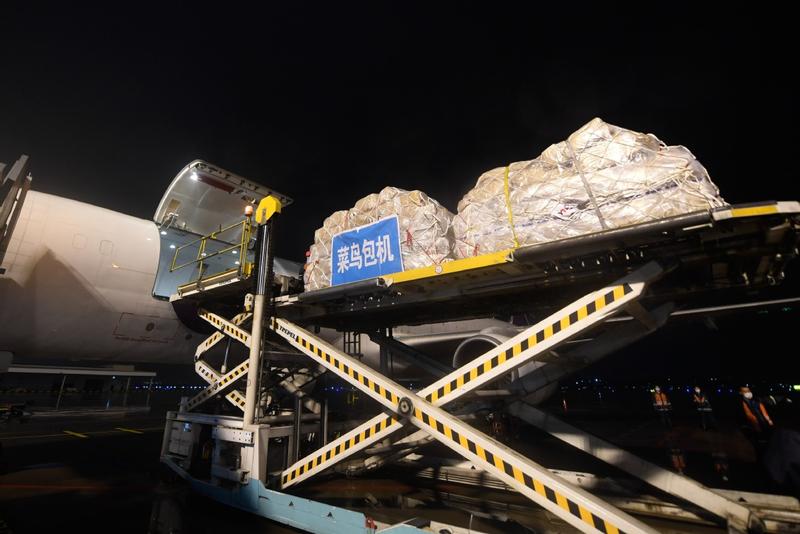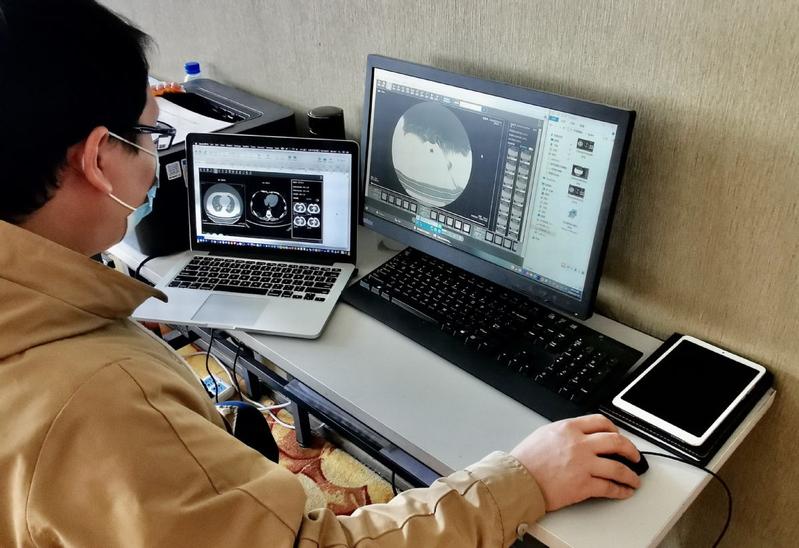 Goods are loaded onto a chartered cargo flight to Kuala Lumpur operated by Chinese logistics firm Cainiao Network Technology at Hangzhou International Airport, Zhejiang province, on March 31, 2020. (PHOTO / XINHUA)
Goods are loaded onto a chartered cargo flight to Kuala Lumpur operated by Chinese logistics firm Cainiao Network Technology at Hangzhou International Airport, Zhejiang province, on March 31, 2020. (PHOTO / XINHUA)
In the wake of the novel coronavirus epidemic, technology has taken on some rather charitable causes, expediting the circulation of key goods and streamlining services essential to saving lives and restoring economic activity.
Alibaba founder Jack Ma has donated massive quantities of surgical masks and test kits to a number of countries, and has been promoting a digital handbook on the experiences of front-line Chinese medical workers in screening, diagnosing and treating COVID-19 patients
China's tech behemoths are answering the central authorities' call to work with the international community in fighting the COVID-19 pandemic, and better leverage their technological prowess and digital offerings to safeguard global public health security.
A string of Alibaba Group entities, from its cloud-computing unit to a research arm, have launched AI technologies and cloud-based solutions that aim to help companies and organizations worldwide tackle the disease.
According to Alibaba, the new tech offerings are designed to help business decision-makers, researchers and medical practitioners address challenges across several major areas including epidemic prediction, fast-track diagnosis as well as knowledge sharing and peer communication.
ALSO READ: High-tech center helps in virus fight
Alibaba founder Jack Ma has donated massive quantities of surgical masks and test kits to a number of countries, and has been promoting a digital handbook on the experiences of front-line Chinese medical workers in screening, diagnosing and treating COVID-19 patients.
"I need your help to share this handbook quickly with hospitals, doctors, nurses and anyone who needs to know around the world," he said in a Tweet, followed by a link to the manual on Alibaba Cloud.
A number of major technology giants are also lending a helping hand. Based on machine learning of public data gathered from across China, the company's in-house innovation institution-DAMO Academy-developed an epidemic prediction solution that is capable of estimating the trajectory of a coronavirus outbreak in a specific region. The algorithm can forecast the scale and duration of infections and also predict their peak periods.
The organization also rolled out an AI-enabled genome-sequencing technology that can simultaneously diagnose 20 people within 14 hours while offering accurate and comprehensive analyses of subjects, and an AI-enabled CT-imaging system that can diagnose COVID-19 in 20 seconds with 96 percent accuracy.
Chinese internet powerhouses are going overseas to boost their influence by leveraging the country's success in bringing the domestic outbreak under better control, said Raymond Wang, global partner at leading consultancy Roland Berger.
"For one, these companies are already world-leading in technologies, sometimes just second to the US. On the other hand, the already high penetration rate in the domestic market is impossible to sustain long-term growth, prompting them to make an overseas presence," Wang said.
Chinese logistics courier Cainiao Network Technology announced it will devote nearly 200 chartered flights to help global businesses resume operations largely disrupted by the novel coronavirus epidemic.
Air cargo transportation is available in more than 100 countries and regions from the end of March to the end of April, as the company claims it is one of the few global logistics networks whose operations have not been affected by the contagion.
The company said in a news release it has launched dedicated flights from cities including Hangzhou, Hong Kong and Harbin to multiple international destinations, such as Moscow, Tel Aviv and Liege, Belgium.
For instance, chartered airfreight now flies five times a week from Hangzhou to Liege, facilitating cross-border trade amid global economic pressure.
Belgium was the first European nation to sign up to the Electronic World Trade Platform (eWTP), an initiative first proposed by Ma in 2016.
As part of the plan, Alibaba's logistics arm Cainiao opened a warehouse in Liege to help businesses in Europe transport goods to China and promote trade.
Powering the operation of Cainiao is a dedicated public service platform in Leige, Belgium, to streamline custom clearance procedures for cross-border trade.
The portal allows merchants, warehouse operators and logistics companies from both China and Europe to conduct real-time inquiries concerning the location of parcels being handled and transported.
Wang Ye, who exports furniture and beauty products to Europe, said the platform and relevant technologies have allowed his merchandise to reach the hands of buyers in just three days.
"One highlight is the computerized and cloud-computing backed capabilities that allow us to inform transporters, logistics, and the customs authorities to go through the process as soon as possible," said Michel Kempeneers, chief operating officer of overseas export at Investment of Wallonia Export and Foreign Investment Agency.
"The main target of eWTP is to develop a powerful, high-value system that has been proven useful and successful in Belgium," he said. "We get to share this model with others as the best practice that can be promoted to other countries in the world."
 A technician tests an AI-powered medical system developed by Alibaba's innovation institution DAMO Academy at Huoshenshan Hospital in Wuhan, capital of Hubei province, in March, 2020. (NIU JING / CHINA DAILY)
A technician tests an AI-powered medical system developed by Alibaba's innovation institution DAMO Academy at Huoshenshan Hospital in Wuhan, capital of Hubei province, in March, 2020. (NIU JING / CHINA DAILY)
Regarding the ongoing battle against the coronavirus pandemic, Chen Guoli, associate professor of strategy at leading business school INSEAD, said: "It's a global public health crisis, and we need more global coordination and collaboration, instead of further dividing with irresponsible statements by politicians. It's time to show that Chinese companies, entrepreneurs and business leaders are caring, humane and socially responsible in this unique and challenging period. Consumers, employees, suppliers, investors and other stakeholders respect socially responsible companies and leaders."
On the global stage, Chinese companies have been more vocal about using technologies to counter the virus
On the global stage, Chinese companies have been more vocal about using technologies to counter the virus. In the latest instance, apps like WeChat and TikTok are joining with global industry peers to launch the COVID-19 Global Hackathon starting March 26, which invites developers to build locally or globally focused software solutions that tackle the challenges brought by the virus.
The consortium has connected with a range of partners including the World Health Organization to understand roughly seven key challenging areas that technological innovation might help resolve, ranging from healthcare and vulnerable populations, to business and entertainment options.
"We hope to encourage more creative solutions based on the WeChat open platform that can tackle COVID-19 challenges faced by people overseas, after many such mini programs have effectively helped people in China," according to a statement from WeChat, backed by Tencent Holdings Ltd, sent to China Daily.
"We will help select projects with the greatest social impact, provide technical support and facilitate their implementation where relevant," the statement said.
According to Tencent, to combat the virus, over 1,000 mini programs in municipal services, healthcare and education have been generated recently, while the Tencent Health Code has become the most used e-path for verifying health and travel history in China, with 10 billion total visits since February.
Tencent Meeting, the company's remote work tool, is also extending its presence overseas as it helps foreign businesses minimize the impact of the pandemic.
The company's endeavor to help Japanese enterprises weather the contagion is the latest example of how Chinese technology comes to the rescue during a public health crisis.
"The need for telecommuting is here to stay if users discover that remote conferencing is as efficient as face-to-face interactions," said Zhao Jiannan, managing director of Tencent Cloud Northeast Asia. "People stand to benefit from fewer business trips and corporates from lowered costs and better efficiency."
At the same time, Chinese healthcare company WeDoctor has announced the launch of a global epidemic-prevention and control platform in a bid to integrate medical resources from home and abroad to offer free assistance to both Chinese and non-Chinese.
For overseas users, they need to follow WeDoctor's official WeChat account and then access free online consultation services via text, graphics and/or voice. Epidemic-related scientific knowledge is also available to users.
For the first phase, WeDoctor has invited 6,129 medical professionals from across China, all of whom are attending and above physicians of departments of respiratory medicine, infectious diseases and general medicine from the country's 3A-grade hospitals, said Liao Jieyuan, the company's founder and CEO.
Experts noted that despite their good intentions, challenges still abound for Chinese tech companies to gain a solid reputation and presence abroad in the short term.
Wang from Roland Berger referred to overseas operating practices along with cultural and ideological differences.
"The epidemic indeed has brought opportunities, because the assistance (offered by Chinese companies) is really badly-needed, and upholds humanity and universal value. But to excel in the business world, Chinese tech giants need to be more 'glocal', i.e. the combination of a global mindset and local operations in respective markets," he said.
READ MORE: Chinese high-tech helps world combat pandemic
Chen said perceptions are unlikely to change overnight.
"Chinese high-tech firms lack brand, reputation, customer awareness and acceptance. If Chinese companies can invest for the long-term, engage in more socially responsible activities and grow with the local community, they will achieve market acceptance and commercial success," he said.


